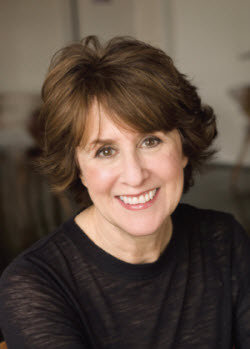IN TOWN

Novelist, screenwriter and playwright Delia Ephron is known for her work on her own (the film The Sisterhood of the Traveling Pants, How to Eat Like a Child) and with her late sister, Nora (the movie You've Got Mail and the play Love, Loss and What I Wore, onstage at Asolo Rep last summer). Her latest novel, The Lion Is In, will be one subject of her conversation when she visits the Jewish Book Festival, March 3 at the Jewish Federation of Sarasota-Manatee's Beatrice Friedman Theater (tickets at jfedsrq.org or 371-4546 ext. 119). And there's sort of a funny story about this one...
Q. I read on your website that The Lion Is In happened because of an anxiety attack and a dream. Pretty odd, right?
A. It's not the usual way I start books! I was upset about a number of things, and then I had a dream about three women in a bar and a lion. I knew they were on the run; I didn't know why. And it took place in North Carolina, a place I'd never been. But I somehow knew it was my story to write, and I immediately started. Writing it was a totally joyous experience, which is not always the case.
Q. Tell me a little more about it.
A. Usually you do the research for a book first, but in this case, I went to North Carolina after the writing, to look at the things I'd written about. There's a tree in my book—a certain lone oak, with no foliage, just naked limbs, that Rita, one of the women, wants for the lion. So my niece is driving me around and suddenly I see that tree and scream, nearly scaring her to death. It was just as I'd pictured it, with the bark all off, in this case from goats rubbing against it.
[cp_quote style="quote_right_dark"]I had a dream about three women in a bar and a lion. I knew they were on the run; I didn't know why. But I somehow knew it was my story to write.[/cp_quote]
Q. You grew up in a family of writers, not only your parents, but eventually your three sisters as well. Did you fight against that gene for a while?
A. Writing was clearly my destiny, but I didn't really become a writer until I was 30. I knew it was a lot to tackle, because of my parents and Nora. Before I started my writing career I got married to the wrong person, had jobs with really crazy bosses, even opened a crocheting business. That's actually what led to writing a book about crocheting, without admitting that I was actually writing. But I love storytelling; I want the reader to want to turn the page.
Q. What was the process of putting together Love, Loss and What I Wore?

We workshopped it over and over, and every time it was worse. Then Linda Lavin said yes to playing the part of Gingy, and with that bit of casting suddenly the play worked.
It's undeniably a woman's experience, and I don't feel ashamed of that. I don't think women's stories are told enough, especially in the movies. Even the romantic comedies these days, it's about the guys. But women are such great readers; you write and they embrace it. --Kay Kipling



